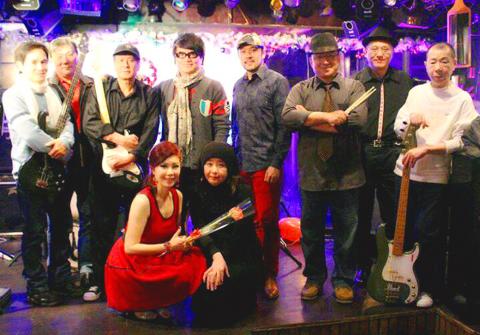The Taipei International Women’s Club will hold its Annual Charity Gala and dinner on March 20 at Far Eastern Plaza Hotel with the theme Black and White. The event will include cocktails, international four course set menu, fashion show, raffle draws and live music by Green Door Basement Band, whose rock ‘n’ roll and Latin jazz tunes will keep you dancing until the wee hours.
For this year, the Cathwel Service (天主教福利會), Tzih Huai Social Welfare Foundation (慈懷基金會) and Taipei International Women’s Club Education Foundation were chosen as benefactors.
■ Far Eastern Plaza Hotel (台北遠東大飯店), 201 Dunhua S Rd Sec 2, Taipei City (台北市敦化南路二段210號).

Photo courtesy of Green Door Basement Band
■ Tickets are NT$2,900, available by contacting Peckhee Lim 0918-300-068, Jin Lee Fuang 0933-015-814 or Mayumi Hu at 0910-221-501

The canonical shot of an East Asian city is a night skyline studded with towering apartment and office buildings, bright with neon and plastic signage, a landscape of energy and modernity. Another classic image is the same city seen from above, in which identical apartment towers march across the city, spilling out over nearby geography, like stylized soldiers colonizing new territory in a board game. Densely populated dynamic conurbations of money, technological innovation and convenience, it is hard to see the cities of East Asia as what they truly are: necropolises. Why is this? The East Asian development model, with

June 16 to June 22 The following flyer appeared on the streets of Hsinchu on June 12, 1895: “Taipei has already fallen to the Japanese barbarians, who have brought great misery to our land and people. We heard that the Japanese occupiers will tax our gardens, our houses, our bodies, and even our chickens, dogs, cows and pigs. They wear their hair wild, carve their teeth, tattoo their foreheads, wear strange clothes and speak a strange language. How can we be ruled by such people?” Posted by civilian militia leader Wu Tang-hsing (吳湯興), it was a call to arms to retake

This is a deeply unsettling period in Taiwan. Uncertainties are everywhere while everyone waits for a small army of other shoes to drop on nearly every front. During challenging times, interesting political changes can happen, yet all three major political parties are beset with scandals, strife and self-inflicted wounds. As the ruling party, the Democratic Progressive Party (DPP) is held accountable for not only the challenges to the party, but also the nation. Taiwan is geopolitically and economically under threat. Domestically, the administration is under siege by the opposition-controlled legislature and growing discontent with what opponents characterize as arrogant, autocratic

When Lisa, 20, laces into her ultra-high heels for her shift at a strip club in Ukraine’s Kharkiv, she knows that aside from dancing, she will have to comfort traumatized soldiers. Since Russia’s 2022 invasion, exhausted troops are the main clientele of the Flash Dancers club in the center of the northeastern city, just 20 kilometers from Russian forces. For some customers, it provides an “escape” from the war, said Valerya Zavatska — a 25-year-old law graduate who runs the club with her mother, an ex-dancer. But many are not there just for the show. They “want to talk about what hurts,” she